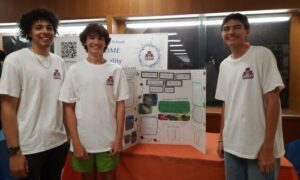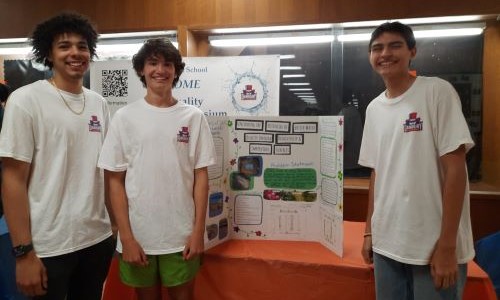
DANBURY, Connecticut — A partnership between the Western Connecticut State University Department of Biology and the Danbury Public Schools benefits the local watershed, middle and high school educators, and future scientists. Finding Our Way, a science, technology, engineering and math (STEM) education outreach program developed by WCSU, offers, among other benefits, an Environmental Stewardship Competition to get students excited about science and preserving the local environment.
The competition is one of the sustained partnerships resulting from a prior National Oceanic and Atmospheric Administration (NOAA) Office of Education’s Bay Watershed Education and Training (B-WET) Program Finding Our Way Middle School grant. Danbury middle schoolers can compete in the Environmental Stewardship Competition by coming up with a project idea that will be judged by Danbury High School (DHS) science teachers and WCSU biology professors. The application deadline is Monday, April 22, 2024, and the winning project will be showcased at an awards ceremony on June 11. Learn more at https://www.wcsu.edu/stem/.
The partnership has enabled middle school teachers to gain training into how to integrate water resources and ecosystem biodiversity into their lessons and implement aligned hands-on, self-directed activities that get middle school students involved in environmental science. The program also fosters lifelong interest in protecting the environment through conservation and sustainable practices.
More recently, high schoolers are becoming involved. WCSU Biology Department Chairperson Dr. Theodora Pinou has developed a spring/summer high school program that provides college readiness and career development opportunities for high school science students interested in this field of study. Danbury High School juniors and seniors who have signed up for an Aquatic Science elective class at DHS have the opportunity to participate in an Environmental Stewardship Competition of their own, as well as obtain paid positions as Spring/Summer Watershed Steward Ambassadors. According to Finding Our Way Outreach Coordinator/Science Community Communicator Maria Silva, a WCSU biology graduate student who is working with Pinou, more than a dozen DHS aquatic science students have already signed up for this opportunity for spring 2024 — an increase from last year.
Melissa Nadeau, Ed.D, STEM Curriculum Administrator at Danbury Public Schools, said, “Collaborating with Dr. Pinou is pivotal to providing our teachers access to collegiate experts practicing and researching STEM fields. Throughout our ongoing partnership, Dr. Pinou has sought to understand our strategic model for continuous improvement and married our vision for teaching and learning with the essential elements of Meaningful Watershed Educational Experience (MWEE) design. The promise of students receiving meaningful watershed educational experiences while participating in hands-on learning about all aspects of our environment is exciting for students in the Danbury area.”
DHS administrators and science teachers encourage ongoing interest in “Finding Our Way” by taking students on field trips to local watersheds, and hosting an annual Aquatic Restoration Research Symposium in the spring. The 2024 symposium will be from 9 a.m. to noon on Wednesday and Thursday, May 22 and 23, at Danbury High School.
A highlight of the spring symposium is the announcement of the winners of the WCSU Environmental Stewardship Competition for the high school Summer Watershed Steward Ambassador program. The most recent winners are Yandiel Adames, Noah Braz, Nicholas Rocha, and Michael Kimisky. The title of their project was “Unlocking the potential of better water quality through biodiversity and impervious surfaces.” Their plan proposes to replace the Danbury High School parking lot pavement material with a pervious asphalt, and to add Connecticut-native shrubs and flowers to the islands to reduce run-off. Talks are underway with Danbury Public Works to see if this is possible.
Barbara Bogart, Aquatics teacher at DHS, said, “Yandiel, Noah and Nicholas were juniors last year and Michael was a senior. I was their teacher. The strength of the watershed restoration project lies in how it fosters and develops collaboration and communication skills with students. The aquatics course is designed as a Problem Based Learning experience and students learn over the arc of the school year, not only science content, but also critical thinking and problem solving skills that will benefit them long after they leave the classroom. All the student groups did an outstanding job in demonstrating these skills and Portrait of a Graduate attributes during the symposium and final competition. Yandiel, Noah, Nicholas and Michael worked hard to revise, redesign and communicate their project ideas to the community. All the students who participated can be very proud of their achievements, and I’m especially happy for my group who won the final round of the competition.”
In addition to the benefits of educating students to be concerned about their community, Nadeau also spoke about the value of the program for the teachers. “The Danbury public schools have a longstanding partnership with Western Connecticut State University, particularly the Finding Our Way learning initiative. This partnership has enhanced STEM learning initiatives for teachers and students in the Danbury public schools. These initiatives have provided teachers with the expertise to integrate Ocean and Watershed literacy lessons into our curriculum by vertically aligning student experiences.”
Nadeau continued, “The Finding Our Way vision encourages expanded partnerships with business and industry partners. These partnerships, such as Housatonic Valley Association or Trout Unlimited, ensure our district’s initiative to implement project-based learning (PBL) opportunities aligns directly with the environmental action projects embedded in the Meaningful Watershed Educational Experience (MWEE) design. While our current curriculum explores these concepts globally, the projects created after teachers’ professional development are necessary to apply them locally, ensuring students understand their place as environmental stewards of our local watershed.”
Danbury High School Science Teacher Aimee Reutzel agreed. “The professional development opportunities allow our staff to examine our current practices and improve upon our instruction by connecting us with partners from community organizations and teaching faculty at the university level. By working with community partners, we are able to understand the job skills necessary to be successful in these industry areas as well as what types of content knowledge are necessary for entry into the workforce. This informs our curricular experiences by embedding job skills and focusing on the application of content as it is applied to hands-on experiences in the watershed. Additionally, connecting with university faculty allows us to better inform our instructional experiences by including laboratory practices for our students and giving students access to scholarly articles. These experiences will better prepare students to enter a college setting. Our students were always interested in how the university faculty conducted studies in our local watershed. This makes the learning experiences relevant because they are happening in our own backyard.”
Reutzel added, “These experiences have also given me the confidence to bring in more professionals to mentor our students. We have brought in industry professionals to provide students with ongoing feedback on their projects and to judge students at our yearly symposium. This creates engaging opportunities for students to learn from professionals while working on their own professional speaking skills.”
Learn more at https://www.wcsu.edu/stem/. For more information, contact Maria Silva at silvamar@wcsu.edu or WCSU Communications and Marketing at pr@wcsu.edu.
Western Connecticut State University changes lives by providing all students with a high-quality education that fosters their growth as individuals, scholars, professionals and leaders in a global society. Our vision: To be widely recognized as a premier public university with outstanding teachers and scholars who prepare students to contribute to the world in a meaningful way.

